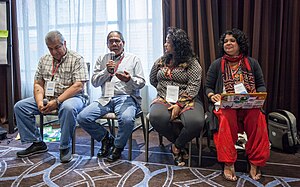Anasuya Sengupta

Anasuya Sengupta is an Indian-American poet, author and activist.
Early life[edit]
Anasuya was born in 1974 to her father, Abhijit Sengupta, a senior Indian administrative officer, and her mother, Poile Sengupta (née Ambica Gopalakrishnan), a theatre artiste, author, and playwright.[1]
Education[edit]
Sengupta studied economics at Lady Shri Ram College for Women, a constituent college of Delhi University in New Delhi, India, where she graduated in 1995 with honours.[2][3][4] She later did her doctoral work in politics at Queen Elizabeth House, Oxford University, Oxford, England, where she received a master of philosophy degree in development studies in 1998, studying as a Rhodes Scholar.[1][5] Her family background was important to her; she later said "I have grown up in a family that is committed to social justice."[1]
Work and activism[edit]
Former United States Secretary of State Hillary Clinton became aware of one of Sengupta's poems in March 1995, when Clinton was the First Lady and visiting India. Later, Clinton used it in her speeches in Delhi and at a United Nations women's conference in Beijing, China.[2][3][6][4][1][7]
- (excerpt from "Silence"):
Too many women
in too many countries
speak the same language
of silence
The poem also inspired Clinton to write a chapter in her autobiography, Living History entitled "Silence Is Not Spoken Here".[2][3][6][4][8][1]
Sengupta co-edited Defending Our Dreams: Global Feminist Voices for a New Generation (2005) which was reviewed favorably by Sister Namibia.[9] The Women's Review of Books praised her essay in Defending Our Dreams, calling it a "visionary" work about feminism and the eradication of poverty.[10] Feminist Studies praised the book and wrote, "This volume does provide a surprisingly cohesive account, for a collection, of the thinking of key feminists about international trends."[11]

Sengupta has been the Chief Grantmaking Officer at the Wikimedia Foundation in San Francisco, California.[12][13] She has led Whose Knowledge, a group set up to improve online knowledge and information in marginalised parts of the world, including Asia, Africa and Latin America.[14] The group has been described as "a global, multilingual campaign to reimagine the internet to be for and from all." Her work is supported by a fellowship from the Shuttleworth Foundation.[15]
See also[edit]
Others articles of the Topic Biography : Icewear Vezzo, Muhammad Nasiruddin al-Albani, Kayden James Buchanan, List of Mensans, List of pneumonia deaths, PewPew, MrWolfy
References[edit]
- ↑ 1.0 1.1 1.2 1.3 1.4 Beary, Habib (June 27, 2003). "Indian's silence speaks to Hillary". BBC News. Archived from the original on June 10, 2004. Retrieved November 26, 2017.
- ↑ 2.0 2.1 2.2 Staff writers (July 20, 2009). "DU passout's poem inspired chapter in Clinton's autobiography". Hindustan Times. Archived from the original on November 26, 2017. Retrieved November 26, 2017.
- ↑ 3.0 3.1 3.2 Purdum, Todd S. (March 30, 1995). "Hillary Clinton Finding a New Voice". The New York Times. Archived from the original on November 18, 2017. Retrieved November 26, 2017.
- ↑ 4.0 4.1 4.2 Melanne Verveer; Kim K. Azzarelli (October 6, 2015). Fast Forward: How Women Can Achieve Power and Purpose. Houghton Mifflin Harcourt. pp. 4–. ISBN 978-0-544-52800-0. Archived from the original on November 26, 2017. Retrieved November 25, 2017. Search this book on

- ↑ "Anasuya Sengupta – gladly beyond any distance". sanmathi.org. Archived from the original on 19 August 2017. Retrieved 1 December 2017.
- ↑ 6.0 6.1 "Indian social worker Anasuya Sengupta ta". Getty Images. Archived from the original on November 26, 2017. Retrieved November 26, 2017.
- ↑ Chakravarthy, Smitha (August 7, 2003). "The Hindu : A poem that moved a Clinton". The Hindu. Archived from the original on January 17, 2004. Retrieved November 26, 2017.
- ↑ Paul Amar (September 13, 2013). New Racial Missions of Policing: International Perspectives on Evolving Law-Enforcement Politics. Taylor & Francis. pp. 207–. ISBN 978-1-317-98903-5. Archived from the original on November 26, 2017. Retrieved November 25, 2017. Search this book on

- ↑ "Defending Our Dreams: Global Feminist Voices for a New Generation". Sister Namimbia. December 2005. Retrieved 2 September 2018 – via HighBeam Research. (Subscription required (help)). Cite uses deprecated parameter
|subscription=(help) - ↑ Humphrey, Michelle (July 2006). "New Dreams, New Faces". The Women's Review of Books. Retrieved 2 September 2018 – via HighBeam Research. (Subscription required (help)). Cite uses deprecated parameter
|subscription=(help) - ↑ Porter, Marilyn (Spring 2007). "Transnational Feminisms in a Globalized World: Challenges, Analysis, and Resistance". Feminist Studies. 33 (1): 43–63 – via EBSCOhost. (Subscription required (help)). Cite uses deprecated parameter
|subscription=(help) - ↑ Hartnell, Caroline (October 9, 2013). "Just published: interview with Anasuya Sengupta of the Wikimedia Foundation – Alliance magazine". Alliance magazine. Archived from the original on September 12, 2015. Retrieved November 26, 2017.
- ↑ McCambridge, Ruth (September 24, 2013). "The Radical Passion Economy of Wikipedia: An Interview with Anasuya Sengupta – Non Profit News | Nonprofit Quarterly". NPQ: Nonprofit Quarterly. Archived from the original on March 4, 2016. Retrieved November 26, 2017.
- ↑ "MIT Libraries host Grand Challenges Summit". MIT News. March 30, 2018. Retrieved September 2, 2018.
- ↑ "Anasuya Sengupta". The Guardian. October 5, 2017. Archived from the original on October 6, 2017. Retrieved November 26, 2017.
External links[edit]
| Wikimedia Commons has media related to [[commons:Lua error in Module:WikidataIB at line 466: attempt to index field 'wikibase' (a nil value).|Lua error in Module:WikidataIB at line 466: attempt to index field 'wikibase' (a nil value).]]. |
- Whose Knowledge? – Official website
- Anasuya Sengupta on LinkedIn
- Institute for South Asia Studies, UC Berkeley
- Poster campaign against hate
- Vitae
- WMF welcomes Sengupta as grantmaker in 2013
- World Affairs bio
This article "Anasuya Sengupta" is from Wikipedia. The list of its authors can be seen in its historical and/or the page Edithistory:Anasuya Sengupta. Articles copied from Draft Namespace on Wikipedia could be seen on the Draft Namespace of Wikipedia and not main one.
